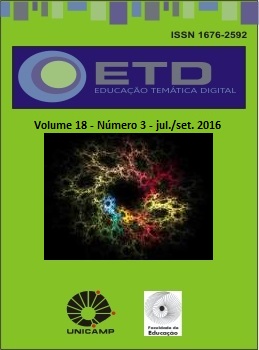Abstract
The relationship of subject and object is commonly treated in educational theories as question how to connect the student with the contend to be appropriated. In Karl Jaspers’ later philosophy, the Periechontology, we find reflections that lead to the limits of the subject-object-division, demonstrating that an absolute and final knowing of Being is impossible. He calls those reflections the fundamental philosophical knowledge that can be considered as an antidote against any totalitarism and dogmatic thinking. We have to transcend the subject-object-relationship and to consider the Being the Embracing of object and subject. Jaspers distinguish seven modes of the Embracing. To-be-there (Dasein), Consciousness in General (Bewusstsein überhaupt) Spirit (Geist) are the subjective and immanent modes, World (Welt) the corresponding objective mode in immanence. Living exclusively in these immanent modes never can satisfy quietly. To find real satisfaction in life we have to transcend immanence. In Jaspers’ view, the step to the transcendent modes can only occur in concomitance of subjective and objective side, to Existence (Existenz) and Transcendence (Transzendenz). It is Jaspers’ philosophical (not religious) faith that humans find identity with themselves in the moment when a cipher of Transcendence is recognized as absolute value by them. The seventh mode is Open Reason (Vernunft). This mode allows that all modes are contemplated in its own sense and unified in our decisions that guide our lives. It is the purpose of the present article to elucidate the pedagogical thinking, underpinned by Jaspers’ Periechontology, characterized by openness, tolerance and existential realization.
References
ARENDT, Hannah. Karl Jaspers: bürger der welt. In: Karl Jaspers. Ed. by Paul Arthur Schilpp. Stuttgart: Kohlhammer, 1957, p. 532-543.
BARTH, Karl. Phänomene des menschlichen. In: Dogmatik, III/2. Zollicon-Zürich: Evangelischer Verlag, 1948, p. 128-143.
EHRLICH, Leonard. Karl Jaspers: philosophy as faith. Amherst: University of Massachusetts Press, 1975.
HERSCH, Jeanne. Karl Jaspers – eine einführung in sein werk. München: R. Piper & Co. Verlag, 1980.
JASPERS, Karl. Der philosophische glaube angesichts der offenbarung. München: R. Piper, 1962.
JASPERS, Karl. Einführung in die philosophie. 17th Ed. München: Piper, 1976.
JASPERS, Karl. Von der wahrheit. München: R. Piper, 1947.
JASPERS, Karl. Wahrheit und bewährung: philosophieren für die praxis. München: R. Piper, 1983.
KORO-LJUNGBERG, Mirka; CARLSON, David; TESAR, Marek; ANDERSON, Kate. Methodology brut: philosophy, estatic thinking and some other (unfinished) things. Qualitative Inquiry, v. 21, n. 07, p. 612-619. Available in: <http://goo.gl/zwJIz9>. Access: 20 June 2016. ISSN 1552-7565.
PIPER, Klaus; SANER Hans (Eds.) Erinnerungen an Karl Jaspers. München, Zürich: R. Piper & Co. Verlag, 1974.
RICOEUR, Paul. Philosophie und religion bei Karl Jaspers. In: Karl Jaspers. Ed. by P. A. Schilpp, Stuttgart: Kohlhammer, 1957, p. 604-636.
ST. PIERRE, Elisabeth Adams. The empirical and the new empiricisms. Cultural Studies ↔ Critical Methodologies, v. 16, n. 02, p. 111-124. 2016. Available in: < http://goo.gl/UAagf1>. Access in: 20 June 2016. ISSN 1552-356X.
ST. PIERRE, Elisabeth Adams; JACKSON Alecia Y.; MAZZEI, Lisa A. New empiricisms and new materialisms: conditions for new inquirity. Cultural Studies ↔ Critical Methodologies, v. 02, n. 16, p. 99-110. 2016. Available in: <http://goo.gl/asvuVA>. Access in: 20 June 2016. ISSN 1552-356X.
TILLIETTE, Xavier. Sinn, wert und grenze der ciffrenlehre. Reflektionen über die metaphysik von Karl Jaspers. Studia Philosophica XX, 115-131. 1960.
WERNER, Martin. Existenzphilosophie und christentum. In: Schweizerische Theologische Rundschau, v. 23, n. 1/2, p. 21-40. 1953.
The ETD - Digital Thematic Education uses the Creative Commons license (CC), thus preserving the integrity of the articles in an open access environment.

